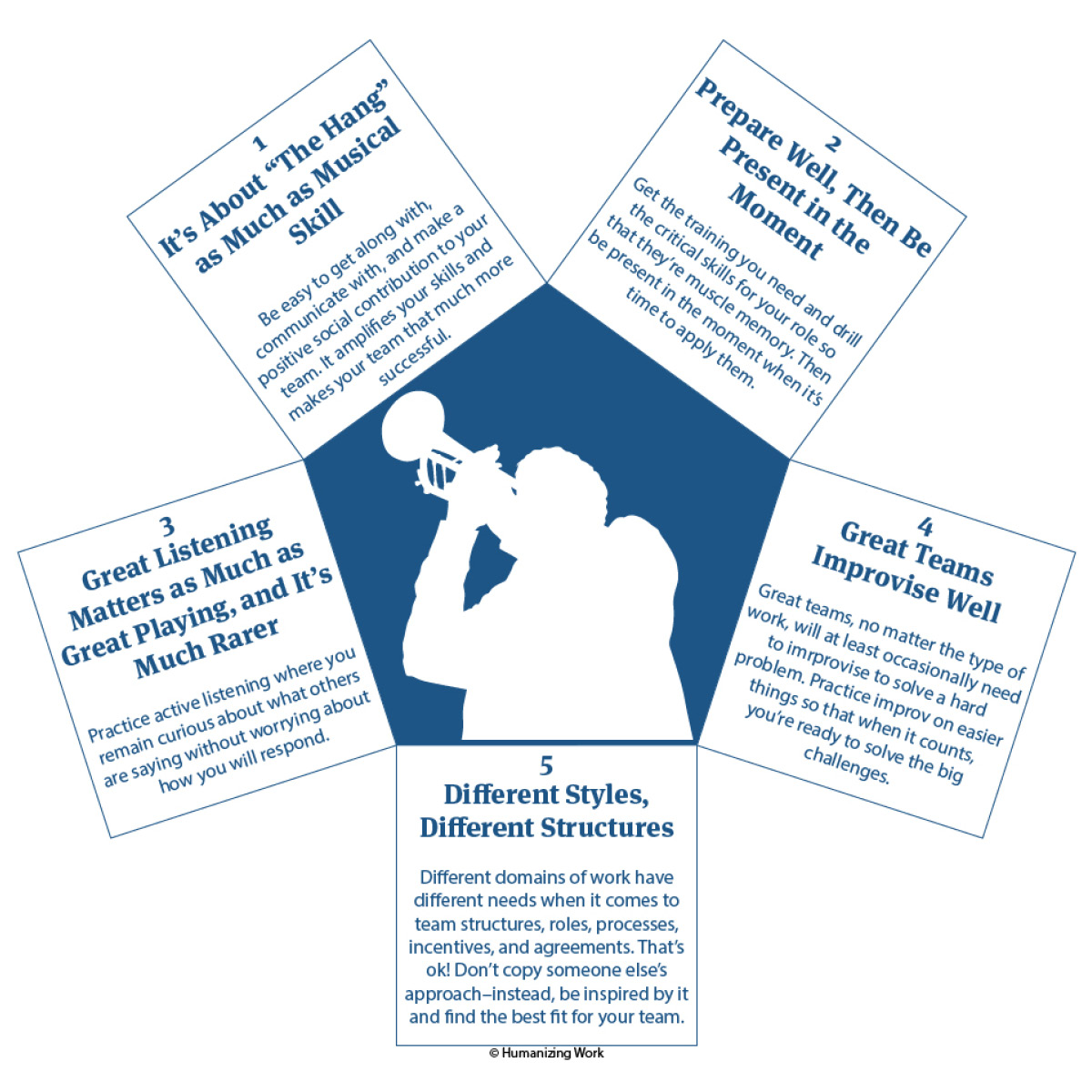 Hi all, it’s Peter here, and I’ve had a busy week musically, playing with multiple groups in different styles in a wide range of venues. It caused me to reflect on what makes a musician successful, and how those same lessons apply to the world of work. Here are five insights I think can help in any work situation.
Hi all, it’s Peter here, and I’ve had a busy week musically, playing with multiple groups in different styles in a wide range of venues. It caused me to reflect on what makes a musician successful, and how those same lessons apply to the world of work. Here are five insights I think can help in any work situation.

1. It’s About “The Hang” as Much as Musical Skill
In the music world, we spend more time together off stage than we do on it. Setting up, rehearsing, communicating details before the gig, hanging out before and after sets, it adds up. Musicians that are easy to get along with, easy to communicate with, and make a positive social contribution are said to be a “good hang,” and they are the first call, sometimes before more skilled musicians that are harder to get along with.
Being a good teammate is the same. Be easy to get along with, communicate with, and make a positive social contribution to your team. It amplifies your skills and makes your team that much more successful.
2. Prepare Well Then Be Present in the Moment
As musicians, we spend decades in the practice room drilling so that translating the notes from the page (or our imagination) to the audience is muscle memory, it requires little or no conscious effort. Then, when we take the stage, we can be fully present in the moment, the music, and the space with the listener. This is the difference between a good technician, and someone that can transport the audience to some shared emotional state.
What in your work world would benefit from skill drill to the point of muscle memory, so that you can be present in the meeting, on the task, or in the presentation? Oh, and shameless sales pitch, we offer lots of training on important work skills, so scroll down to check out some options.
3. Great Listening Matters as Much as Great Playing, and Is Much Rarer
As I mentioned in the intro, I played with a lot of different groups last week. My enjoyment (and the audience’s) was directly impacted by a key factor on the stage: were the other musicians listening? In bands where everyone is just playing their part, getting through the performance, the music was professional but uninspiring. In bands where everyone is locked in, listening to each other? It’s like a different form of art! There’s give and take, a conversation, and new things emerge that we couldn’t have planned!
In work, this is at least as true. Most of us are listening just enough to start formulating what we’ll say next. Instead, stay curious about what others are saying, and trying to say, without worrying about how you will respond. That curiosity and active listening changes something in the conversation, deepening safety and opening more options.
4. Great Teams Improvise Well
Not every genre of music involves improvisation. But even in styles where performing what’s on the page is expected, the ability to improvise in the moment is critical. I once heard a violist in a world-class string quartet tell the story of performing a late Beethoven quartet, one they’d played from memory for decades. There was a viola solo at one point in the music, and when they reached that point, their mind went blank. They’d forgotten the music! To their shock and relief, one of the violinists noticed, somehow, that something was wrong, and began playing the viola line on the violin, without missing a beat. A few measures later, the violist jumped back in.
Even if your work team doesn’t need to improvise, you’re just turning out predictable, high quality work, sometimes things happen, and you need to improvise. The ability to jump in and come up with a creative solution to an unexpected problem is a key capability, regardless of the type of work.
5. Different Styles, Different Structures
In one group, I arrived at the venue with no idea of what songs we’d play, how we’d approach them, etc. It was pure jazz–someone called a tune, counted it off, and the musicians were expected to know it and jump right in. We improvised around some shared cultural norms in the jazz world, and a listener couldn’t be criticized for assuming we’d rehearsed just these songs in just this order many times before.
In another group, the music was sent out ahead of time, in the order we’d play it, with detailed sheet music. We were expected to perform exactly what was on the page together.
Different styles have different structures and expectations, and that’s ok! Maybe the type of work you do requires following detailed checklists to reliably get high-quality results over and over again. Maybe you’re on a team trying to create an innovative product or service the world has never seen before. Those two teams need different structures, rules, incentives, and agreements.
I hope applying one or more of these musical principles to your work will unlock some new capabilities for you.
For more business insights from the world of music, check out our show episode on Jazz, Teams, and Work.
Skill Building Opportunities
Leadership
Humanizing Work’s New Leadership Intensive (virtual, instructor-led)
Leadership Circle Profile 360 Evaluation
Effective Goal Setting (online, self-guided)
Product Management
Certified Scrum Product Owner Workshop (virtual, instructor-led)
Advanced Certified Scrum Product Owner Workshop (virtual, instructor-led)
80/20 Product Backlog Refinement (online, self-guided)
Two Week Backlog Makeover (online, self-guided)
The Theory of Constraints (online, self-guided)
Facilitation & Team Building
Certified ScrumMaster Workshop (virtual, instructor-led)
Facilitating Effective Retrospectives (online, self-guided)
Last updated